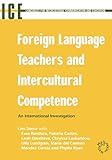Foreign Language Teachers and Intercultural Competence : An Investigation in 7 Countries of Foreign Language Teachers' Views and Teaching Practices / Lies Sercu.
Material type: TextSeries: Languages for Intercultural Communication and EducationPublisher: Bristol ; Blue Ridge Summit : Multilingual Matters, [2005]Copyright date: ©2005Description: 1 online resource (232 p.)Content type:
TextSeries: Languages for Intercultural Communication and EducationPublisher: Bristol ; Blue Ridge Summit : Multilingual Matters, [2005]Copyright date: ©2005Description: 1 online resource (232 p.)Content type: - 9781853598449
- 9781853598456
- online - DeGruyter
| Item type | Current library | Call number | URL | Status | Notes | Barcode | |
|---|---|---|---|---|---|---|---|
 eBook
eBook
|
Biblioteca "Angelicum" Pont. Univ. S.Tommaso d'Aquino Nuvola online | online - DeGruyter (Browse shelf(Opens below)) | Online access | Not for loan (Accesso limitato) | Accesso per gli utenti autorizzati / Access for authorized users | (dgr)9781853598456 |
Browsing Biblioteca "Angelicum" Pont. Univ. S.Tommaso d'Aquino shelves, Shelving location: Nuvola online Close shelf browser (Hides shelf browser)

|

|

|

|

|

|

|
||
| online - DeGruyter Studies of Fossilization in Second Language Acquisition / | online - DeGruyter Three is a Crowd? : Acquiring Portuguese in a Trilingual Environment / | online - DeGruyter Language and Aging in Multilingual Contexts / | online - DeGruyter Foreign Language Teachers and Intercultural Competence : An Investigation in 7 Countries of Foreign Language Teachers' Views and Teaching Practices / | online - DeGruyter Directions in Applied Linguistics : Essays in Honor of Robert B. Kaplan / | online - DeGruyter Language Learners in Study Abroad Contexts / | online - DeGruyter Early Trilingualism : A Focus on Questions / |
Frontmatter -- Contents -- Foreword -- Preface -- Chapter 1: Teaching Foreign Languages in an Intercultural World -- Chapter 2: Objectives of Foreign Language Teaching and Culture Teaching Time -- Chapter 3: Familiarity and Contacts with Foreign Cultures -- Chapter 4: Pupils’ Culture-and-language Learning Profile -- Chapter 5: Culture Teaching Practices -- Chapter 6: Culture in Foreign Language Teaching Materials -- Chapter 7: Experiential Culture Learning Activities: School Trips and Exchange Projec -- Chapter 8: Opinions Regarding Different Facets of Intercultural Competence Teaching -- Chapter 9: The Foreign Language and Intercultural Competence Teacher -- Chapter 10: The Future of Intercultural Competence in Foreign Language Education: Recommendations for Professional Development, Educational Policy and Research -- References -- Appendix 1: Questionnaire -- Appendix 2: Bonferroni Multiple Comparisons Test Results
restricted access online access with authorization star
http://purl.org/coar/access_right/c_16ec
Foreign Language Teachers and Intercultural Communication: An International Investigation reports on a study that focused on teachers’ beliefs regarding intercultural competence teaching in foreign language education. Its conclusions are based on data collected in a quantitative comparative study that comprises questionnaire answers received from teachers in seven countries: Belgium, Bulgaria, Poland, Mexico, Greece, Spain and Sweden. It not only creates new knowledge on the variability, and relative consistency, of today’s foreign language teachers’ views regarding intercultural competence teaching in a number of countries, but also gives us a picture that is both more concrete and more comprehensive than previously known.
Mode of access: Internet via World Wide Web.
In English.
Description based on online resource; title from PDF title page (publisher's Web site, viewed 01. Dez 2022)


